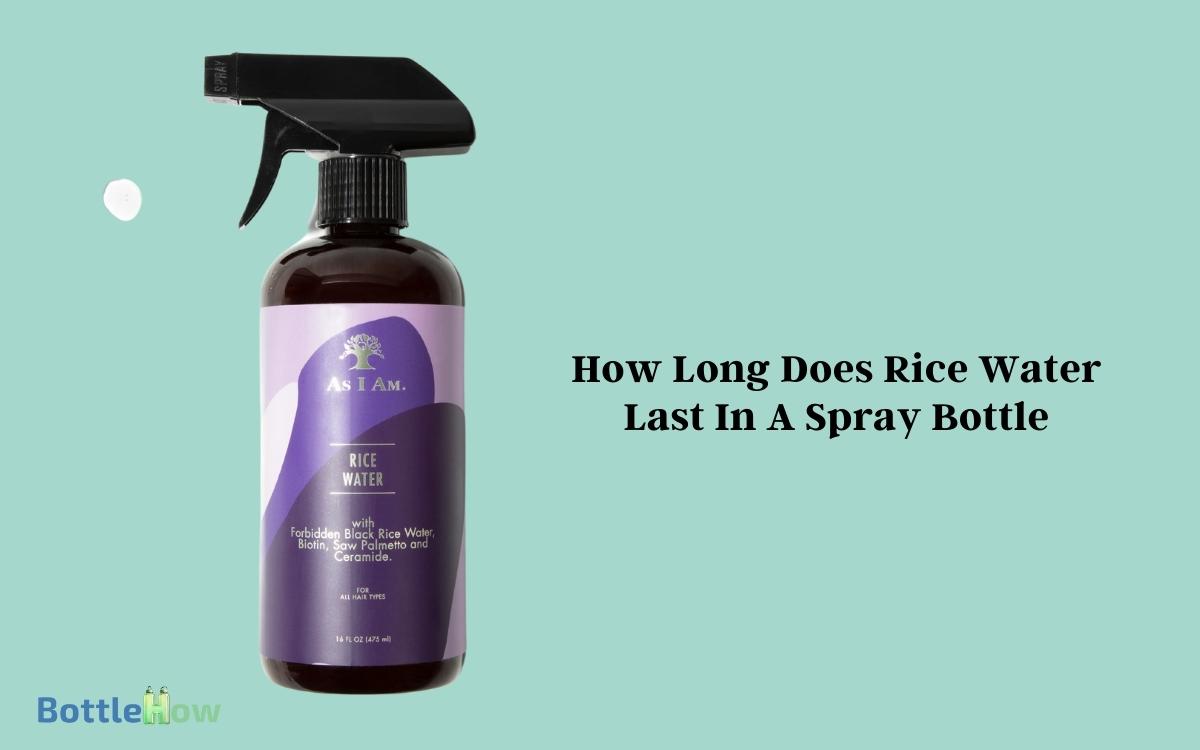How Long Does Rice Water Last in a Spray Bottle? Explained!
When you store rice water in a spray bottle, it can last up to a week if you keep it refrigerated. Make sure to use a clean, dry, and sterilized spray bottle to prevent bacterial growth and spoilage.
Store the bottle in a cool, dark section of your fridge to maintain its quality. Always inspect the rice water for any sour smell, changes in color, or mold before use, as these are signs of spoilage.
Toss it out immediately if you notice any of these indicators. Following these steps can greatly extend the rice water’s life, giving you more time to explore its benefits.

Key Takeaways
Understanding Rice Water
Rice water, the starchy liquid obtained by soaking or boiling rice, is renowned for its beneficial properties for hair and skin care. You’ll find it’s rich in vitamins, minerals, and amino acids, essential for nurturing healthy hair and a glowing complexion.
As a beauty therapist or hair care professional, understanding these properties allows you to offer informed advice to clients seeking natural, effective solutions. Rice water enhances hair strength, reduces breakage, and promotes shine.
For skin, it acts as an anti-inflammatory and brightening agent, soothing irritation and enhancing skin tone.
Preparation and Storage
Now that you understand the benefits of rice water, let’s discuss how to prepare and store it effectively to maintain its efficacy.
To prepare rice water, first rinse your rice thoroughly to remove any impurities. Then, soak the clean rice in water for 30 minutes to an hour, allowing the nutrients to seep into the water. Strain the mixture, collecting the water in a clean container.
For storage, pour the rice water into a clean spray bottle or airtight container to minimize contamination and oxidation.
Remember, you’re aiming to preserve the nutrients and beneficial properties of the rice water, so meticulousness in preparation and storage is key to ensuring it serves its purpose well.
Ideal Storage Conditions
To maximize the shelf life of rice water in your spray bottle, you’ll need to take into account several key factors.
- First, store it in a cool, dark place to minimize exposure to temperature fluctuations and light, which can degrade its quality.
- Next, choose a container made of non-reactive material like glass or BPA-free plastic to prevent any chemical interactions.
Temperature and Light Exposure
Maintaining your rice water spray bottle in a cool, dark place greatly prolongs its usability. Exposure to high temperatures and direct sunlight can degrade the quality of rice water, leading to spoilage and reduced effectiveness.
Ideally, you should keep the bottle in a location where temperatures remain consistently cool—preferably below room temperature. This helps preserve the integrity of the nutrients and compounds in the rice water that are beneficial for your hair or skin.
Avoid areas near windows, heaters, or in direct light, which can cause fluctuations in temperature and premature decay. Remember, maintaining a stable environment not only preserves the rice water but ensures that you’re providing the best quality care in your service to others.
Container Type and Material
Selecting the appropriate container type and material is essential for maximizing the shelf life of your rice water. Opt for glass spray bottles, as they’re vital and don’t interact chemically with rice water, preserving its quality and freshness.
Plastic bottles, although convenient, can sometimes leach chemicals into the rice water, especially if exposed to varying temperatures.
Glass also offers superior protection against odors and ensures your rice water remains uncontaminated by previous contents, which is vital when you’re aiming to provide the best care in your services.
Always make sure the bottle is clean and dry before filling it with rice water to prevent any mold or bacteria growth, which could compromise its effectiveness and safety.
Humidity and Airflow Impact
Understanding how humidity and airflow affect rice water in your spray bottle is vital for maintaining its potency and preventing spoilage.
High humidity levels can promote bacterial and fungal growth, shortening the shelf life of your rice water. It’s recommended to store the spray bottle in a cool, dry place to mitigate these risks.
Good airflow also plays an essential role. Make sure the storage area is well-ventilated to prevent the accumulation of moisture, which could degrade the rice water’s quality. You’ll want to avoid placing the bottle in bathrooms or kitchens where humidity tends to be higher.
Impact of Temperature
Understanding the impact of temperature on rice water stored in a spray bottle is essential for maintaining its efficacy.
You’ll find that rice water remains stable at room temperature for a limited period, typically a few days.
However, if you’re looking to extend its shelf life, storing it in the refrigerator can preserve its quality for up to a week, while exposure to high temperatures can rapidly degrade its beneficial properties.
Room Temperature Stability
When stored at room temperature, rice water in a spray bottle remains stable for only 24 to 48 hours before it begins to deteriorate. This limited shelf life is important for you to understand, especially if you’re aiming to use rice water in your beauty or health routines.
After 48 hours, harmful bacteria can begin to develop due to the nutrient-rich environment rice water provides. It’s essential you monitor its freshness to guarantee safety and effectiveness. Always smell the rice water before use; a sour or foul odor indicates spoilage.
For best use, prepare small batches that you can use within a two-day window. This practice helps maintain the quality of the rice water, ensuring you provide the best care with each application.
Refrigeration Preservation Duration
Storing your rice water in the refrigerator can significantly extend its shelf life up to one week, maintaining its quality and effectiveness for beauty treatments. Keeping the mixture cool inhibits bacterial growth, which preserves its beneficial properties.
To optimize its preservation, store the rice water in a clean, airtight spray bottle to minimize exposure to contaminants. Make sure to label the bottle with the date of preparation, so you’re always aware of its freshness.
It’s important to monitor the smell and appearance of the rice water; any sour or unusual odors indicate spoilage, and it should be discarded immediately. This practice ensures you provide the best quality treatment with every use, maximizing benefits while ensuring safety and satisfaction.
Heat Exposure Effects
While refrigeration can extend the shelf life of rice water, exposing it to heat can greatly reduce its quality and effectiveness. Heat accelerates the degradation process, promoting bacterial growth and fermentation.
If you’re storing rice water in a spray bottle, it’s vital to keep it away from direct sunlight and high temperatures. Ideally, store your bottle in a cool, dark place to maximize its longevity.
Should you notice any sour smell or cloudy appearance, it’s best to discard the contents, as these are signs of spoilage. Remember, your goal is to guarantee the highest quality and safety in the products you offer.
Managing temperature effectively helps you achieve this, enhancing your service to others with reliable, beneficial treatments.
Signs of Spoilage
You should discard your rice water if it develops a sour smell, changes in color, or shows visible mold growth. These signs indicate that the rice water is no longer safe for use and could potentially harm your skin or hair.
A sour odor suggests bacterial activity, while changes in color can signal contamination or degradation of the natural components. Mold growth, often appearing as fuzzy or slimy spots, is a clear sign of spoilage and must be taken seriously.
Always inspect the spray bottle before each use, making sure that the contents remain clear and free of any off-putting scents. Prioritizing safety helps guarantee that you provide the best care for yourself and those you serve.
Refrigeration and Shelf Life
To extend the freshness of rice water, refrigerating it immediately after preparation greatly improves its shelf life.
When stored in a clean, airtight spray bottle, it can remain usable for about a week under ideal conditions. It’s essential that you monitor its condition and use it while it’s still beneficial. If you notice any changes in color, smell, or consistency, it’s best to discard and replace it. Understanding how long water lasts in spray bottle situations can help ensure effectiveness and hygiene. Regularly cleaning the bottle before refilling also helps maintain its quality over time.
- Check Daily: Inspect clarity and smell each day.
- Keep it Cool: Store the bottle in the coldest part of your fridge.
- Use a Clean Bottle: Make sure the bottle is sterilized before use.
- Label the Bottle: Note the date of storage.
- Discard Promptly: Don’t hesitate to throw it out at the first sign of spoilage.
Following these steps ensures you deliver the best care with your rice water applications.
Adding Preservatives
Adding natural or synthetic preservatives can greatly extend the shelf life of rice water in your spray bottle. When you’re aiming to provide the best care for your clients, ensuring the longevity and effectiveness of your products is key.
Here’s a practical guide on preservatives you might consider:
| Preservative Type | Typical Use |
|---|---|
| Vitamin E | Natural antioxidant that helps prevent oxidation |
| Grapefruit Seed Extract | Natural, broad-spectrum antimicrobial |
| Benzyl Alcohol | Synthetic, effective against bacteria and fungi |
| Phenoxyethanol | Synthetic, widely used for its stability and efficacy |
Each option has its own benefits, depending on your specific needs and the preferences of those you serve. Choose wisely to maintain the integrity and effectiveness of your rice water concoctions.
Usage Frequency Effects
While preservatives extend shelf life, the frequency of using rice water also plays a significant role in its effectiveness and safety. Frequent use might lead to faster degradation of its beneficial properties, making it important to monitor how often you apply it.
Here are key points to keep in mind:
- Daily Use: May deplete essential nutrients quicker.
- Weekly Application: Helps maintain potency over time.
- Usage Tracking: Keep a log to observe changes in efficacy.
- Observation of Results: Adjust frequency based on hair or skin response.
- Storage Check: Regularly inspect the spray bottle for signs of spoilage.
Alternative Storage Methods
Exploring alternative storage methods can greatly enhance the longevity and efficacy of your rice water solution. Instead of relying solely on a spray bottle, consider using airtight glass containers for storage.
These can markedly slow down the fermentation process, preserving the rice water’s beneficial properties for a longer period.
Store these containers in a cool, dark place, ideally in your refrigerator, where the colder temperature further inhibits bacterial growth. For daily use, you can transfer a small amount into your spray bottle from the larger glass container.
This method not only maintains the solution’s potency but also reduces the need for frequent preparation, helping you serve your clients or family with a consistently high-quality product.
Benefits of Fresh Rice Water
Now that you understand storage techniques, let’s discuss how using fresh rice water can greatly enhance the health and vitality of your hair and skin.
Fresh rice water is packed with nutrients that provide several benefits:
- Enhances Hair Growth: It contains amino acids that help in the regeneration of hair and aid faster growth.
- Improves Skin Texture: Rich in vitamins B, C, and E, it helps in tightening your skin and minimizing pores.
- Adds Hair Shine: Acts as a natural conditioner, giving your hair a silky sheen.
- Soothes Irritated Skin: Its anti-inflammatory properties help in soothing sunburns and rashes.
- Strengthens Hair Roots: The inositol in rice water reduces surface friction and enhances hair elasticity, preventing breakage.
Common Storage Mistakes
Often, people mistakenly leave rice water at room temperature for an extended period, diminishing its effectiveness and shelf life. You should always store it in a refrigerator to prevent bacterial growth and preserve its beneficial properties.
Don’t forget to use an airtight container or spray bottle; exposure to air can lead to contamination. It’s also essential to label the container with the date of preparation.
Rice water shouldn’t be used for more than 5-7 days, even when refrigerated. If you notice any foul smell or discoloration, it’s best to discard it immediately.
These steps guarantee the rice water remains potent and safe, maximizing its benefits for your clients or personal use.
Conclusion
Imagine rice water as a delicate blossom, thriving best when freshly picked. Storing it in a spray bottle is like preserving its essence, but only for a brief 5-7 days in the refrigerator.
Beyond this, its petals wilt signaled by a sour smell or murky appearance. Maintain your rice water vibrant by embracing cool, dark places and sealing it tightly.
This care guarantees you harness its full, beautifying potential, avoiding the decay that comes from neglect or improper storage.






